After five rounds of play, Russia’s Ian Nepomniachtchi emerged as a clear leader in the 8-player 2020 Candidates, having defeated Wang Hao of China. With 3.5/5, he is half a point ahead of second-placed Maxime Vachier-Lagrave who drew with Russian wild-card Kirill Alekseenko. On other boards, American Fabiano Caruana was lucky to escape with a draw against Anish Giri, while the game between Grischuk and Ding Liren finished last with the two splitting a point after a long battle.
After a day of draws (Round 4) came a day of sharp lines and edgy play at the 2020 Candidates. Finally, one player managed to rise above the rest – Ian Nepomniachtchi, as he defeated Wang Hao of China. This was a battle between two leaders (Nepomniachtchi, Wang Hao and Vachier-Lagrave were tied for the first place after four rounds). Before this game, the two met four times and the score was even: one win each and two draws. The last time they faced each other in a game with classical time control was at the Danzhou super tournament in 2016. That encounter ended in a draw. Not this time, however!
After 1.e4 Wang Hao opted for the Petrov Defence as Black. White quickly started pushing his h-pawn towards the black king’s fortress. The move is considered a novelty and became a cause for Black to go into deep calculations. Commentators – including world champion Magnus Carlsen – noted that pushing the h-pawn has become more common at the top level as a clear sign of how AlphaZero (the powerful chess computer, which patented the idea behind the move) was influencing the game.
Both players demonstrated a high level of preparation and the position was mostly balanced. Although Ian was persistently looking for opportunities, a draw remained the most likely outcome. However, Wang Hao first allowed Ian’s queen to infiltrate into his camp and then committed a fatal error with 32…Qd7? (a bold 32…Nxd4 with the idea of launching a counterattack on the light squares was sufficient for a draw). Nepomniachtchi was quick to capitalize on the opponent’s misstep and after a forced sequence Black had to give up a piece and resigned immediately.
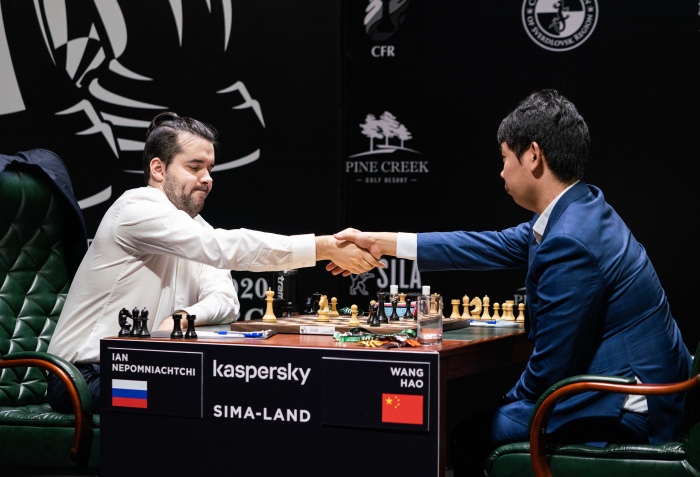
The complexity of the game was shown later in the post-mortem – both players spent well over 10 minutes in live commentary analyzing the lines suggested by chess engines. Wang Hao did not seem disappointed after the game, while Nepomniachtchi (currently ranked as the fifth strongest player in the world and the only one at the top to have a better score against world champion Magnus Carlsen), was very calm and reserved about his lead, saying it’s still early days.
One of the favorites Fabiano Caruana is counting his lucky stars after he managed to escape with half a point in the game with Anish Giri.
From the very opening, Anish Giri (who played as White) pushed and came down hard on his opponent. The American later confessed that he didn’t remember the right line after Giri surprised him in the opening and was forced to improvise. The improvisation, however, led to Giri’s achieving a dominating position, making Black feel quite uncomfortable (“I was borderline lost”, said Caruana after the game).
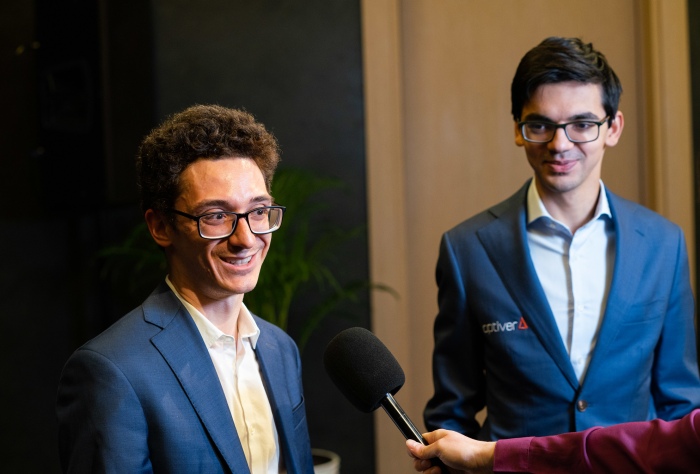
However, it is the resilience and the will to ‘bugger on’ at even the toughest of times that sets the best from the rest. Caruana kept defending well and hoping for his luck to turn. Then came a turning point in the game: despite obtaining a better position – deemed by some as almost winning – Anish Giri made several substandard moves and let his advantage disappear. After Caruana managed to reach the time control and equalized position a draw was called.
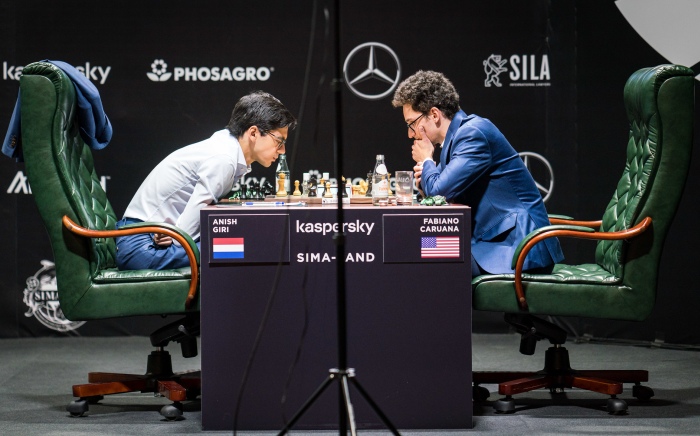
This was not the first lucky escape the American had facing Anish Giri: the Dutchman was completely winning with White vs. Caruana in Candidates 2016 in Moscow, but – as now in Yekaterinburg – Giri missed his chances in a sharp position and then tried to break through for 96 moves to no avail.
In the interview after the game, Anish Giri gave the following assessment of the outcome: “I was better, but… I cannot say I saw a win but there were options there”.
This game leaves one of the top favorites to win the event – Fabiano Caruana – “only” on 50 percent after a third of the games played!
In one of the most exciting duels of the day between Kirill Alekseenko (Russia) and Maxime Vachier-Lagrave (France), a double-edged Najdorf Sicilian was played. For quite a long time the opponents followed the footsteps of Magnus Carlsen and Vachier-Lagrave himself (the game was played in London back in 2019) and diverted only on 16th move when Black introduced a very important novelty 16…g6. Then the game reached its crescendo when White (Alekseenko) sacrificed a rook for a pawn on the kingside, which was immediately met by Black’s sacrificing an exchange on c3.
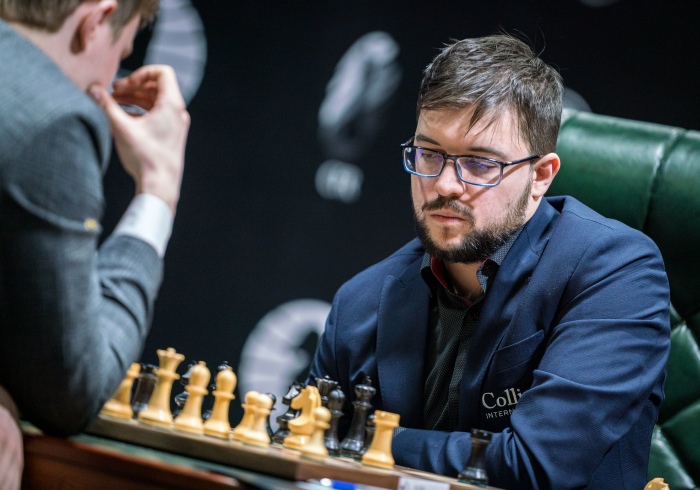
Both players were very well prepared, but the number of tactical lines available forced less experienced Alekseenko to spend an hour more than his opponent did. Interestingly, this was the second time in this tournament that Vachier-Lagrave experienced his opponent spending almost an hour on a single move (in the fourth round Grischuk spent almost an hour for an obvious move). The Frenchmen later commented that if this happens to him again, that he will ask the Chief Arbiter “to bring some board games out” so he could amuse himself.
However, in the game between Kirill Alekseenko and Vachier-Lagrave – all the excitement was there at the board as both needed to make sure not just that they calculate correctly but also, not to forget any of the relevant lines that were possible. This put higher pressure on the Russian wild-card Alekseenko who was in serious time trouble. To his credit, the Russian managed to find the right moves just in time and the two agreed on a draw.
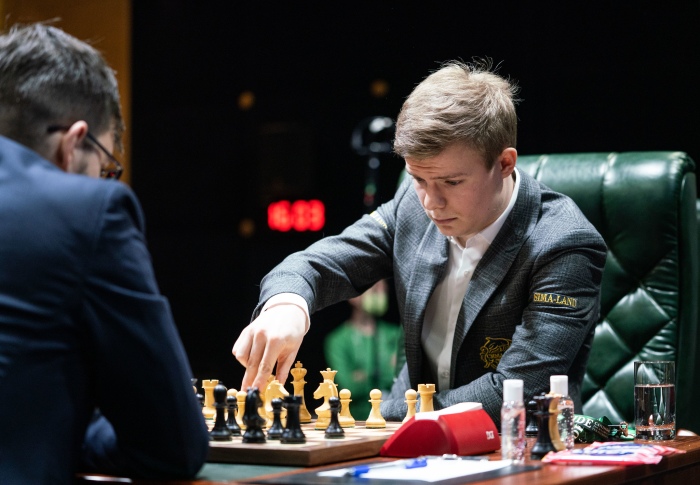
In the interview which followed, both players noted that sharp positions demand that the players remember the lines clearly. “I try to remember the main lines by heart, but you can’t remember everything. Also, when you know some key positions, you don’t need to remember everything by heart”, said Maxime Vachier-Lagrave. Explaining why he spent 50 minutes on one move, Alekseenko said that he knew that he had to sacrifice his rook when he did, but could not remember the rest of the line.
This outcome left the Frenchman in a comfortable second place, with three points out of five. “I think I have been playing much better, especially in terms of time control. I am close to the lead and we’ll see what happens”, Maxime Vachier-Lagrave said after the game.
His opponent, Kirill Alekseenko, also felt buoyed after the game: “I feel better than in the first rounds. This was the first ‘normal game’ for me, without any big mistakes. I’m sure it’s getting better.” Alekseenko is now on two out of five, the same as Giri and Ding Liren.
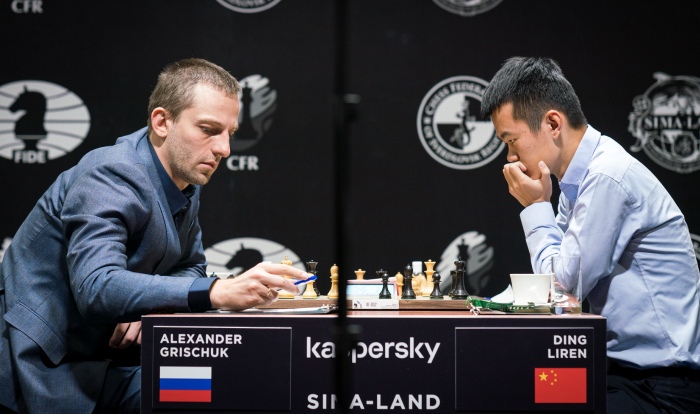
The last game of the day to finish was the encounter Alexander Grischuk (Russia) – Ding Liren (China). Grischuk was, as in all previous rounds, a couple of minutes late for the start. As other players started their games and their board was empty, it was noticeable that Grischuk and Ding Liren are the only two players to have different chairs from the rest. It turned out that both players at the start of the event replaced the special luxury chairs with the more “simple” ones, which were meant for the audience.
As he sat down to play, Grischuk shook his opponent’s hand (an unusual gesture in the Coronavirus world) and proceeded to carefully rub sanitizing gel over his hands before adjusting his pieces and making the first move. Ding Liren was not bothered as he patiently waited for his opponent to start. The game saw a trendy line of the Ruy Lopez and turned into a long battle in which Black gradually balanced out the initial advantage of White’s first move. Finally, the position transpired into an equal endgame in which the opponents split a point.

“It was a very good game but not a very interesting one”, said Grischuk afterward, while Ding Liren lamented on having forgotten his opening preparation. Overall, this is a fifth consecutive draw for Grischuk at the Candidates and he is on 50%. Ding Liren – seen as the favorite before the event – is now on 2/5 but confident that his strength is improving and he is getting into his element.
Standings after Round 5:
1. Ian Nepomniachtchi – 3½
2. Maxime Vachier-Lagrave – 3
3-5. Fabiano Caruana, Wang Hao, and Alexander Grischuk – 2½
6-8. Ding Liren, Kirill Alekseenko and Anish Giri – 2
Round 6 of the 2020 Candidates Tournament starts at 4 PM local time on March 23. The pairings for the fifth round are:
Alexander Grischuk (Russia) – Fabiano Caruana (USA)
Kirill Alekseenko (Russia) – Anish Giri (The Netherlands)
Ian Nepomniachtchi (Russia) – Ding Liren (China)
Wang Hao (China) – Maxime Vachier-Lagrave (France)
Official website: https://en.candidates-2020.com
FIDE website: www.fide.com
Chess Federation of the Sverdlovsk Region: www.ural-chess.com
Press inquiries: press@fide.com
Text: Milan Dinic
Photo: Maria Emelianova and Lennart Ootes

About the partners:
Sima Land – Title sponsor of the FIDE Candidates Tournament
Algorand – Official blockchain partner
Kaspersky – Official cybersecurity partner
PJSC PhosAgro – General partner of the CFR
Mercedes-Benz Russia – Official Auto Partner
Pine Creek Golf Resort – Partners
SILA International Lawyers – FIDE legal partner
You can find more information about the partners at
www.en.candidates-2020.com/partners

